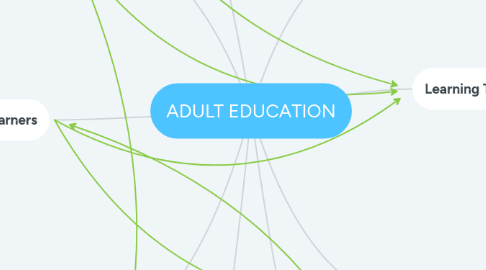ADULT EDUCATION
by James Nolan


1. Lesson Plans
1.1. Learning Objectives
1.2. Order of Presentation
1.3. Learning Assessments
1.3.1. Multiple Choice Tests
1.3.2. Written Assignments
1.3.3. Discussion
1.4. Ethical Decision Making
2. Technological Aids
2.1. Online Classrooms
2.2. Computer Based Training
2.3. Microsoft Powerpoint
2.4. You Tube
2.5. Microsoft Word
3. Adult Learners
3.1. Ages 25+
3.2. Motivations
3.2.1. Goal-Oriented
3.2.2. Activity-Oriented
3.2.3. Learning-Oriented
3.2.4. Internal Factors
3.2.4.1. Self-Esteem/Confidence
3.2.5. External Factors
3.2.5.1. Monetary Bonus
4. Education Providers
4.1. Public Schools/Colleges
4.2. Proprietary Schools
4.2.1. Cosmetology Schools
4.2.2. Truck Driving Schools
4.3. Agencies for educational and noneducational needs
4.3.1. Health care agencies
4.4. Agencies that provide education for members
4.4.1. Churches
4.4.2. Business/Industry
4.4.3. Government
5. Trends and Issues
5.1. Social Justice
5.2. Distance Learning
5.3. Online Classrooms
5.4. Changing Needs of the Adult Learner
5.4.1. Societal Changes
5.4.2. Family Changes
5.4.3. Changes in Motivation
5.5. Organizational Structure
5.6. Diversity
5.7. Technology
5.8. Educational Standards
6. Learning Theories
6.1. Andragogoy
6.2. Transformative Learning
6.3. Experiential Learning
6.4. Multiple Intelligences
7. Instructional Models
7.1. ADDIE Model
7.2. Dick and Carey Systems Approach
7.3. Gagne's Nine Events of Instruction
7.4. First Principles of Instruction
8. Types of Education
8.1. Formal
8.1.1. College/Universities
8.1.2. Trade Schools
8.2. Informal
8.2.1. Faith Based Learning
8.2.2. Community Programs
8.2.3. Military Training
8.3. Self-Directed
8.3.1. Reading News
8.3.2. Socialization
8.3.3. Reading about a topic of interest
9. Program Planning
9.1. Planning Models
9.1.1. Precede-Proceed
9.1.2. Interactive and Question Based
9.1.3. Power and Interests
